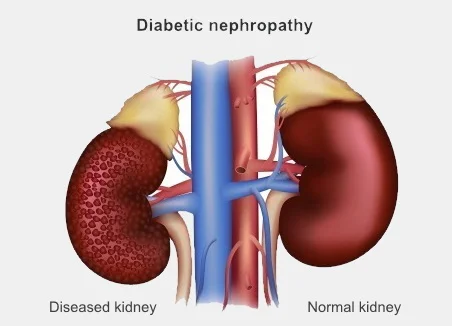Diabetic nephropathy

In a kidney clinic overseen by Dr. Anil Patel, diabetic nephrology would be a critical area of focus given the prevalence of diabetes as a leading cause of kidney disease. Here’s an overview of how Dr. Patel and his team might approach diabetic nephrology:
Diagnosis and Screening: Dr. Patel emphasizes early detection and screening for diabetic nephropathy in patients with diabetes. This involves regular monitoring of kidney function through blood tests (e.g., serum creatinine, estimated glomerular filtration rate) and urine tests (e.g., albumin-to-creatinine ratio) to detect signs of kidney damage.
Glycemic Control: Tight glycemic control is essential in managing diabetic nephropathy to help slow the progression of kidney disease. Dr. Patel works closely with patients to develop personalized diabetes management plans that include lifestyle modifications, oral medications, insulin therapy, and continuous glucose monitoring to achieve target blood sugar levels.
Blood Pressure Management: Hypertension often coexists with diabetic nephropathy and can accelerate kidney damage. Dr. Patel focuses on controlling blood pressure through lifestyle modifications (e.g., dietary changes, weight management, regular exercise) and antihypertensive medications to reduce the risk of further kidney damage.
Proteinuria Management: Proteinuria (excess protein in the urine) is a hallmark feature of diabetic nephropathy and is associated with poor outcomes. Dr. Patel employs strategies to reduce proteinuria, such as renin-angiotensin-aldosterone system (RAAS) inhibitors (e.g., ACE inhibitors, ARBs), which have renoprotective effects and can help slow the progression of kidney disease.
Dietary Management: Dr. Patel’s clinic provides dietary counseling and nutrition education to patients with diabetic nephropathy. Dietary modifications, including limiting sodium and protein intake, managing carbohydrate intake to control blood sugar levels, and ensuring adequate hydration, can help optimize kidney health and overall well-being.
Medication Management: Dr. Patel carefully assesses medication regimens for patients with diabetic nephropathy, considering factors such as kidney function, drug interactions, and potential nephrotoxicity. He adjusts medication doses and selects medications that are safe and effective in managing diabetes and associated comorbidities.
Complication Prevention and Management: Dr. Patel educates patients about the importance of regular medical follow-up, foot care, eye exams, and other preventive measures to reduce the risk of complications associated with diabetes and kidney disease.
Advanced Therapies: In cases of advanced diabetic nephropathy and kidney failure, Dr. Patel may discuss advanced treatment options, including dialysis and kidney transplantation, with patients. He provides comprehensive evaluation, counseling, and support to help patients make informed decisions about their treatment options.
Multidisciplinary Collaboration: Dr. Patel collaborates closely with other healthcare providers, including endocrinologists, diabetes educators, dietitians, and nephrology specialists, to provide integrated and coordinated care to patients with diabetic nephropathy.
Overall, Dr. Anil Patel’s kidney clinic offers comprehensive care for patients with diabetic nephropathy, with a focus on early detection, glycemic control, blood pressure management, lifestyle modifications, and individualized treatment plans to optimize kidney health and improve long-term outcomes.
